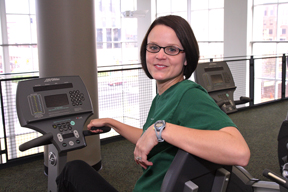It’s June 2006 and the young woman is simultaneously preparing for and eagerly awaiting her wedding day in October.
 |
| Jennifer Babl, assistant director of marketing for the Campus Rec Center, has battled Crohn’s disease for four years. She is helping raise money for Crohn’s research by forming a team to take part in the Take Steps for Crohn’s & Colitis Walk May 31. |
The pain in her stomach, however, is getting worse — unbearable actually. It had been two years since she had been diagnosed with Crohn’s disease, an incurable illness that attacks the digestive system, and the medicine she was on wasn’t working very well.
“I had been sick for several months,” Jennifer Babl says now. “But the pain that June, it was rough.”
Now two years later — and still in the honeymoon phase of her marriage — Babl’s Crohn’s disease is in remission. A drug called Remicade® is helping to manage her disease. But the assistant director of marketing for the Campus Recreation Center says her mission to aid researchers searching for a cure is just beginning.
Babl is forming a UAB team to take part in the Take Steps for Crohn’s & Colitis Walk at Homewood Central Park May 31. The walk, which raised money used in research to develop Remicade®, is the nation’s largest annual event to raise money to find cures for the debilitating diseases. The program is organized by the Crohn’s & Colitis Foundation of America.
“Finding new medication to ease the suffering of this disease is especially important to me,” Babl says.
“Because of the research dollars raised by the foundation, a medication was found that has led to my medically induced remission. Of course, the ultimate goal and my hope is to find a cure.”
Attacking disease
Some 1.4 million American adults and children suffer from Crohn’s disease or ulcerative colitis, according to the foundation, and as many as 150,000 of those are under age 18. Most people develop the diseases between ages 15 and 35.
Crohn’s disease can attack anywhere from the mouth to the anus, while ulcerative colitis inflames only the large intestine (colon). Symptoms may include abdominal pain, persistent diarrhea, rectal bleeding, fever and weight loss. Many patients require hospitalization and surgery. The disease rarely is life-threatening but it can cause severe complications, including colon cancer in patients with long-term disease.
Diet and nutrition are very important in management of the diseases to prevent malnutrition and extreme weight loss. Babl is extremely conscious of her diet and health needs, eating healthy foods as much as possible and working out five or six days a week.
“I definitely do my best to stick to my workout routine and a healthy diet,” she says. “There’s not a specific diet for Crohn’s, but you learn as you go what you can and cannot eat. A well-rounded, high-fiber diet works best for me, but everyone is different. I think it’s like anything – you need to eat healthy foods.”
The diseases are not often talked about in the media, which is part of the reason why Babl says the walk is important.
“This is our opportunity to be around others who are battling the same problems and talk about what we do to manage the disease, what our doctors are saying or hearing,” Babl says. “It’s also our chance to bring awareness about these diseases to others.
“It’s actually somewhat surprising how many people have one of these diseases. I always joke that it’s like the six degrees of Kevin Bacon. If you start talking to someone they inevitably will go, ‘Oh, my mom’s best friend has it’ or ‘My neighbor has it.’ It’s more prevalent than people may realize.”
To join Babl’s team or make a donation, visit her Web site. For more information about becoming involved in Take Steps for Crohn’s and Colitis, visit www.cctakesteps.org or contact Babl at jmedlock@uab.edu.